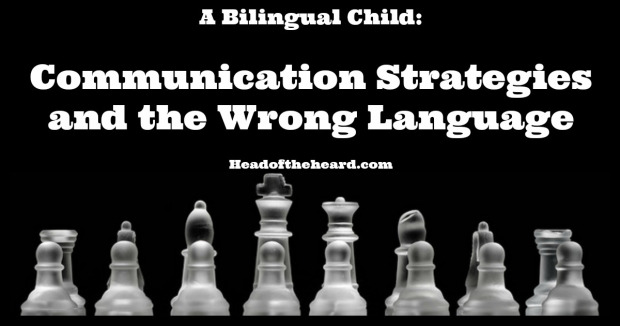 I read a very instructive post recently by Multilingual Living called ‘4 reasons why a bilingual child answers in the “wrong” language.’
I read a very instructive post recently by Multilingual Living called ‘4 reasons why a bilingual child answers in the “wrong” language.’
My almost-4-year-old son replies to me in the ‘wrong’ language. By ‘wrong language’ I mean that I speak to him in English and he usually replies in Portuguese. I think the main reason for this is that he knows I understand him so it is easier for him to use the language he encounters 99% of the time.
I am not particularly worried about this. Before Mr T was even born we decided on what our language plans were going to be. One of the principles we came up with was that our child should be free to use whatever language he/she wanted to use. The aim was communication, not communication in a specific language. We didn’t want to force our child to speak a particular language as we thought this might lead to resentment. Instead, we hope that through constant exposure the two languages would be picked up normally.
He seems to have a great passive knowledge of English, as he seems to understand pretty much everything I say to him. This patient approach is also starting to provide some success as he has been producing more English with me in the last few weeks, even if it is stock phrases like, ‘I’m the boss in this house!’ and ‘I’m not tired!’
He is exposed to quite a bit of English. He obviously hears me speaking all the time, and when his mamãe and I are speaking in his presence we usually use English as well. We try to make sure that any TV he watches is in English, and most of the songs we listen to are also in English. Finally, there is his family in the UK that speaks English to him.
And this UK family is perhaps the key yo the whole thing. They speak very little, if any, Portuguese so when he is with them he has a choice. Either make the effort to speak English, find a different way of communicating, or simply not be understood.
When we were in the UK over Christmas and New Year, his mamãe and I went to Edinburgh for a few days, leaving Mr T in the capable hands of my parents. We were slightly worried about how they were going to communicate, but regular Skype calls home reassured us that there were no huge problems. Mr T was able to find a way of communicating his needs. Sometimes, this was by taking his time to think about an English word. At other times it took a bit more creativity, like jumping up and down and holding his crotch to show my dad he needed to go to the toilet.
He has even started to do this with me now. The other day he wanted to know how to say ‘siga‘ in English. I pretended that I didn’t understand, hoping that I could get him to remember it in English himself. Instead he acted it out with one hand following another.
It is these communication strategies that I find amazing. A desire to get your meaning across, couple with a knack for using whatever tool is at your disposal is surely an important life skill that will serve him well in the future, whatever that might be.
Image Credit



